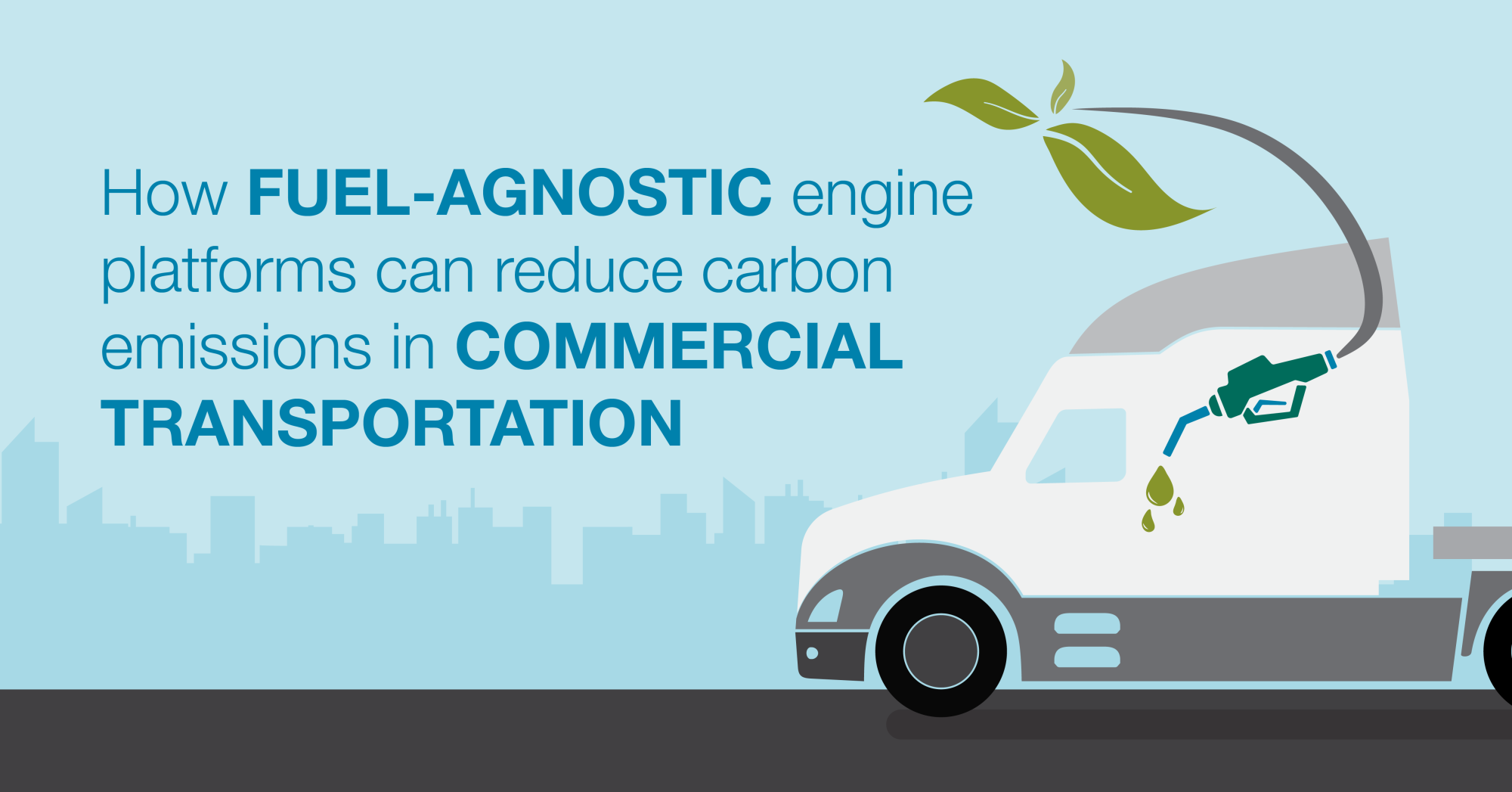How fuel-agnostic engine platforms can reduce carbon emissions of commercial transportation
By Jonathon White, Vice President – Engine Business Engineering

The transportation sector emits five million metric tons of CO2 a day in the U.S. This is about 36 pounds of carbon every day for each person in the U.S.
Passenger cars, motorcycles, heavy-duty trucks, trains, boats, and airplanes all contribute to this carbon emission, but at varying levels. When you look at the increased greenhouse gas (GHG) emissions among these transportation applications, you find some unexpected trends.

For example, aircrafts, ships, and boats collectively are generating less GHG emissions compared to 30 years ago.
Meanwhile, medium and heavy-duty trucks collectively had the largest increase in GHG emissions through the same period. In fact, the GHG emissions of trucking went up by 93%.

There are a range of technologies to alter this emissions trend for trucking. Fuel cells and batteries are two of these. Currently, they are financially and operationally viable in few medium and heavy-duty trucking applications.
Fuel agnostic engine platforms is another technology to alter this trend, and already financially and operationally viable in a wide range of medium and heavy-duty trucking applications.
What is a fuel-agnostic engine platform?
A fuel-agnostic engine platform offers different versions of the same base engine. The bottom ends of the engines look the same, and unique cylinder heads are designed to accommodate a different low or zero carbon fuel. Each engine within the platform can run on one specific fuel; different than fuel flexible engines that can run on multiple fuels. These different engine versions have a high degree of parts in common.
Let’s see how these fuel agnostic engine platforms can reduce or eliminate carbon emissions.

How to reduce emissions by becoming fuel-agnostic and using engines?
Fuel-agnostic engine platforms reduce carbon emissions by enabling vehicles to run on low to zero carbon fuels using the familiar internal combustion engine technology.
Natural gas is one of these low carbon fuels. Today, you can already order natural gas engines that emit 90% less NOx and 16% less CO2 compared to the current EPA standards. These engines can even achieve carbon-negativity when fueled with renewable natural gas (RNG).
Then comes hydrogen, a zero carbon fuel, at the tailpipe. You can use internal combustion engines and use hydrogen as the fuel to power your fleets. Most recently, we have announced collaboration with Werner Enterprises to integrate hydrogen internal combustion engines in vehicles. We are optimistic that we will bring hydrogen engines to more customers in near future.
These are great developments in terms or reducing and eliminating carbon emissions. Meanwhile, you might already be asking yourself how becoming fuel-agnostic could impact reliability and mission accomplishment of vehicles.
Reliability and mission accomplishment while being fuel-agnostic
The choice between reliability and reduced emissions is not a trade-off. I believe becoming fuel-agnostic by using internal combustion engines offers the ideal balance of reliability and reduced carbon emissions.
These fuel-agnostic platforms are designed and built-upon the learnings extracted from millions of diesel engines manufactured and in-use. We also leverage today’s digital technologies to extract insights specific to each engine duty cycle, and leverage these to design reliable fuel-agnostic platforms.
Moreover, technicians' existing familiarity with these fuel-agnostic platforms strengthens the day-to-day reliability of these engines. Yes, there are service and maintenance tasks that vary by fuel type, but most of these tasks are familiar to technicians.
This brings us to the last consideration: Economic affordability of fuel-agnostic engine platforms.
Reduced cost of adopting low to zero carbon emission technologies
Vehicle redesign, manufacturing process changes, and technician training are some of the costs to adopt new technologies for vehicles. Use of internal combustion engines to become fuel agnostic brings important financial advantages for OEMs and fleets.
- Minimal vehicle redesign: Engines within a fuel-agnostic platform have a common product architecture. For OEMs, there is less need to alter vehicle design to accommodate different versions of the same engine family. Meanwhile, there will still be design differences among engines using different fuels when it comes to fuel tanks and aftertreatment systems.
- Limited manufacturing process changes: The need to re-tool production lines and create manufacturing processes to accommodate engines that are a part of a fuel-agnostic platform is lower than adopting a completely new power technology.
- Reduced incremental technician training: Engines within a fuel-agnostic platform look and feel like the products technicians are already familiar with. This familiarity results in service and maintenance similarities for technicians already capable to work on diesel counterparts.
Fuel-agnostic engine platforms offer a unique combination of benefits for OEMs and fleets interested to reduce their vehicles' emissions. The immediate reduction in carbon emissions, economic viability, and reliability are three of the most critical benefits of fuel-agnostic engine platforms.
Author Profiles

Jonathon White, Vice President – Engine Business Engineering
Jonathon White is Vice President of Engine Business Engineering at Cummins Inc. He has more than 30 years of experience in the development and manufacturing of diesel and natural gas engine powertrain systems. He is currently responsible for Engine Business engineering activities across product platforms life cycle, including leadership for the Engine Business Platform Teams, Operational Engineering, Customer Service Engineering and Product Improvement, Technical Operations and Powertrain Engineering organizations.
Related Tags